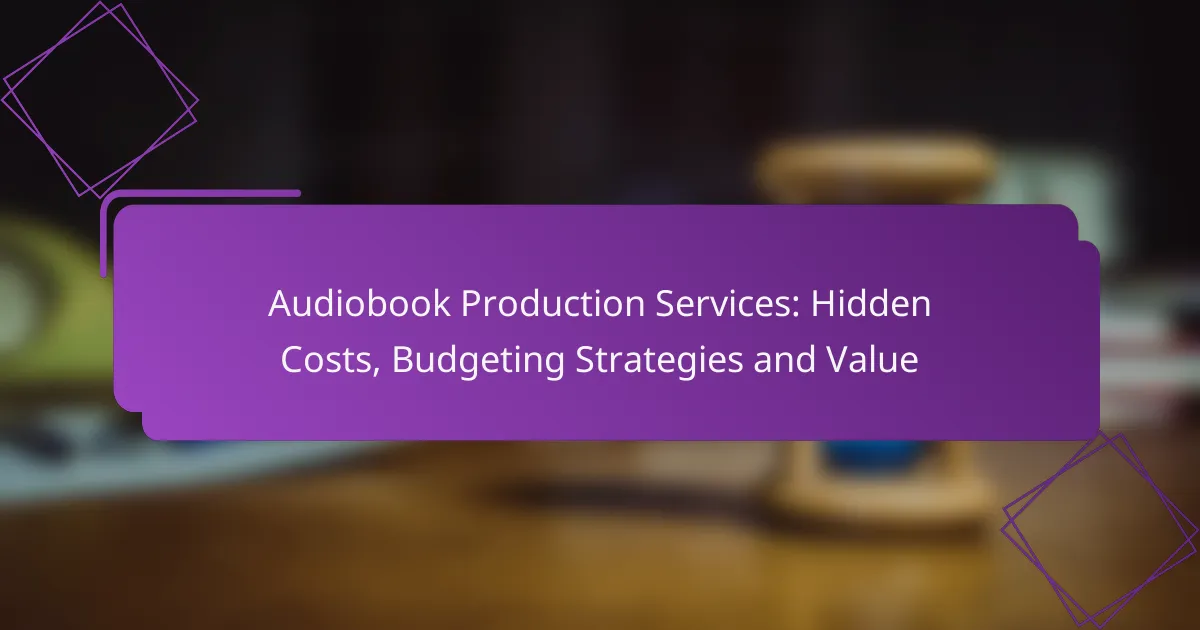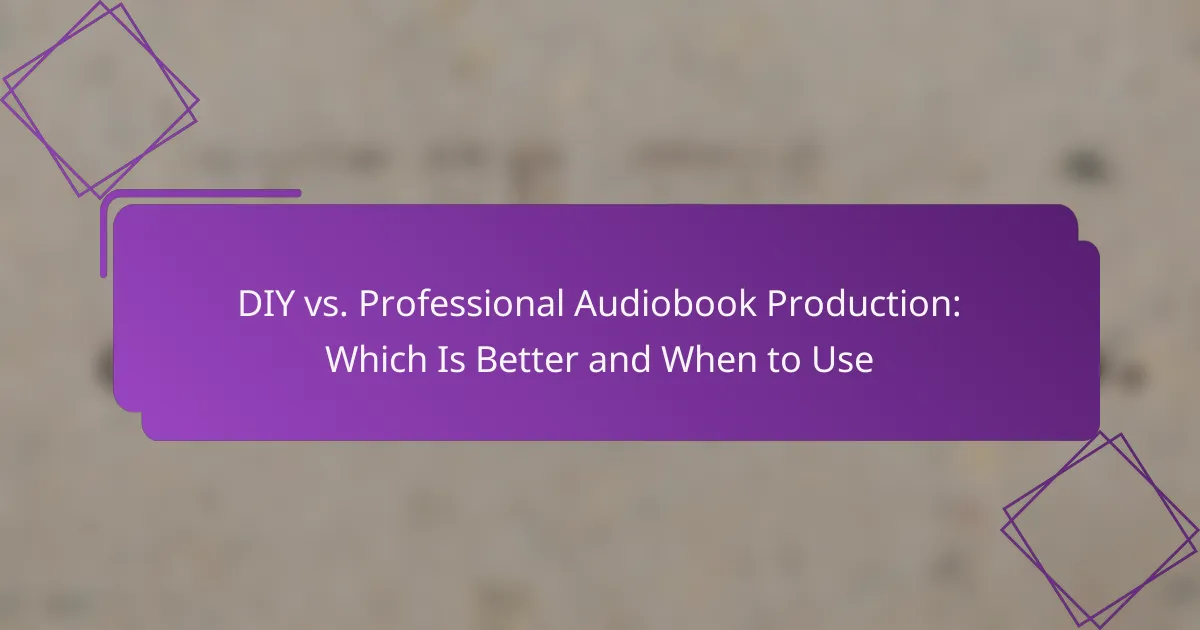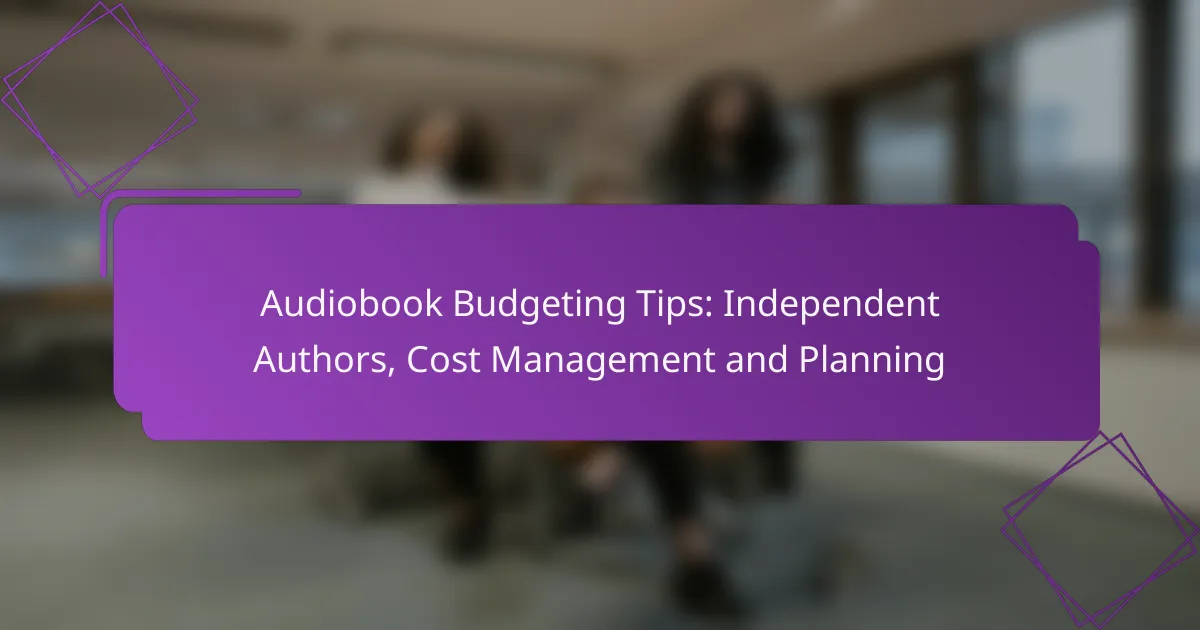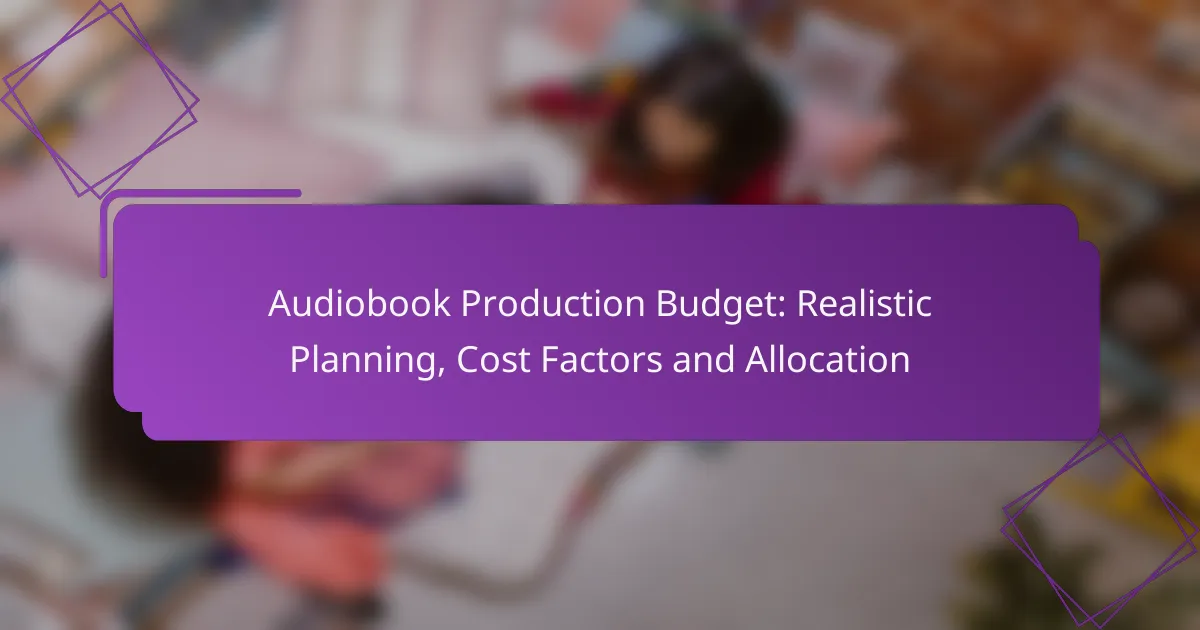When venturing into audiobook production, it’s crucial to be aware of hidden costs that can affect your budget, such as studio fees, talent rates, and marketing expenses. Effective budgeting requires a thorough understanding of these costs and careful allocation of funds across various production phases. By doing so, you can ensure a successful project that balances quality and affordability.
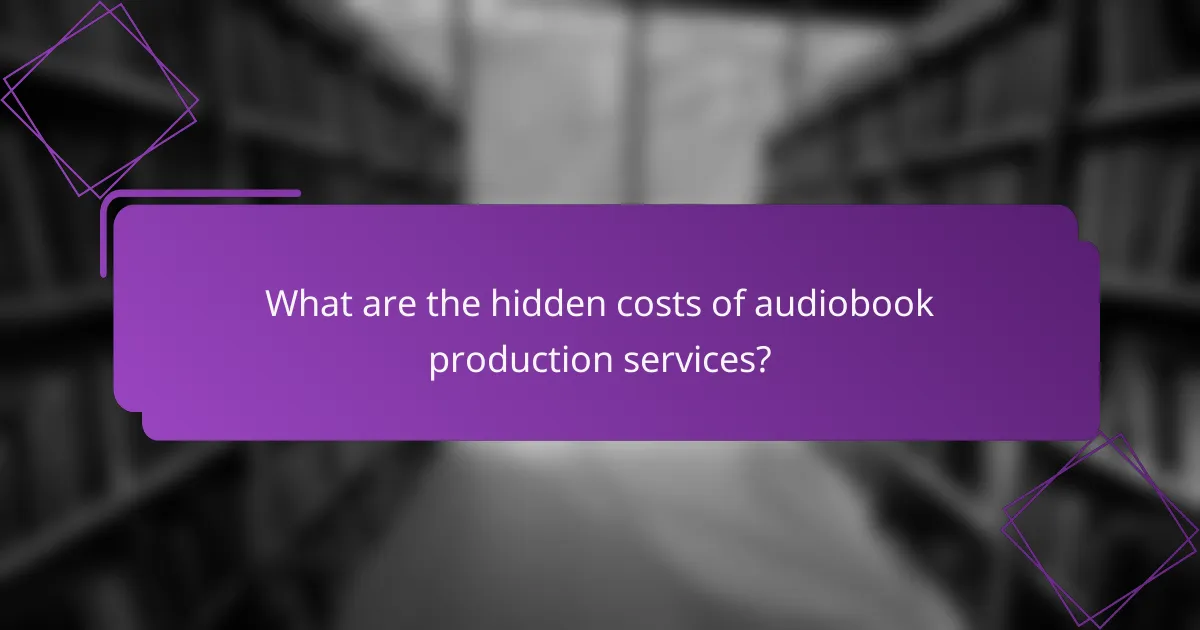
What are the hidden costs of audiobook production services?
Hidden costs in audiobook production can significantly impact your overall budget. These expenses often include studio rental fees, voice talent rates, editing and mastering expenses, distribution fees, and marketing costs, which may not be immediately apparent when planning your project.
Studio rental fees
Studio rental fees can vary widely based on location and the quality of the facility. Rates typically range from $50 to $200 per hour, depending on the studio’s equipment and reputation. It’s essential to factor in the total hours required for recording, as longer sessions can quickly inflate costs.
When selecting a studio, consider whether it offers package deals that include additional services, such as sound engineering, which may provide better value than renting a space alone.
Voice talent rates
Voice talent rates can differ significantly based on experience, project length, and the talent’s reputation. Rates generally range from $100 to $500 per finished hour of audio, with established narrators commanding higher fees. Be sure to clarify whether the rate includes any additional costs, such as revisions or retakes.
Consider auditioning multiple voice talents to find the right fit for your project while balancing quality and budget. Some platforms offer competitive rates for emerging talent, which can help reduce costs.
Editing and mastering expenses
Editing and mastering are crucial steps in audiobook production that can incur additional costs. Professional editing services typically range from $50 to $150 per hour, depending on the complexity of the work. Mastering, which ensures audio quality and consistency, may add another $100 to $300 to your budget.
To manage these costs, consider hiring a freelancer or a service that offers bundled editing and mastering packages, which can be more economical than hiring separate professionals.
Distribution fees
Distribution fees can vary based on the platforms you choose to release your audiobook. Some services charge a flat fee, while others take a percentage of sales, typically ranging from 20% to 40%. It’s important to read the terms of each distribution service carefully to understand their fee structure.
Choosing a distribution platform that aligns with your sales goals can help minimize costs. For instance, platforms with lower upfront fees may be beneficial for independent authors with limited budgets.
Marketing costs
Marketing costs are often overlooked but can be significant in promoting your audiobook. Expenses may include social media advertising, promotional materials, and website development, which can total anywhere from a few hundred to several thousand dollars. Setting aside a budget for marketing is essential for reaching your target audience.
To optimize your marketing spend, consider leveraging free or low-cost promotional channels, such as social media, email newsletters, and partnerships with book bloggers or influencers. This approach can help maximize visibility without overspending.
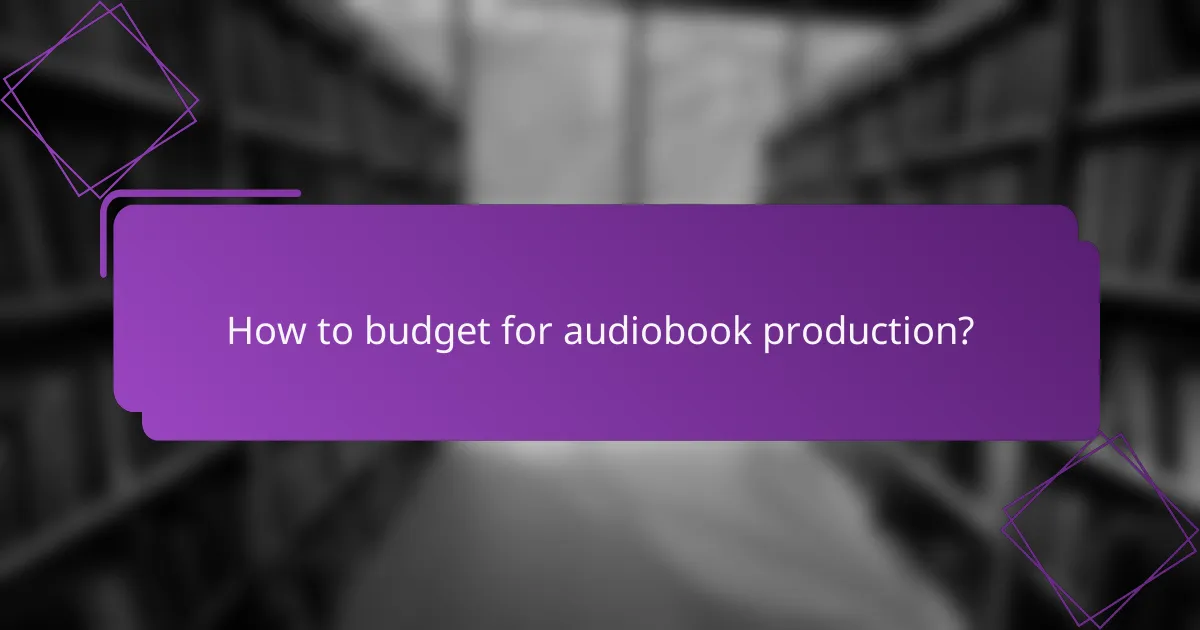
How to budget for audiobook production?
Budgeting for audiobook production involves understanding the various costs associated with the process and allocating funds accordingly. By estimating total production costs, distributing funds across different phases, and considering contingency funds, you can create a realistic budget that meets your project’s needs.
Estimate total production costs
Estimating total production costs is the first step in budgeting for an audiobook. This includes expenses such as hiring voice talent, studio time, editing, and mastering. Depending on the quality and experience of the professionals you hire, costs can range from a few hundred to several thousand dollars.
To get a clearer picture, consider breaking down the costs into categories: pre-production (script preparation), production (recording), and post-production (editing and mastering). This breakdown helps identify where most of your budget will be allocated.
Allocate funds for each production phase
Once you have a total cost estimate, allocate specific amounts to each production phase. For example, you might decide to spend 40% on production, 30% on post-production, and 30% on marketing. This allocation ensures that you are prepared for the financial demands of each stage.
Be mindful of the potential for unexpected costs in each phase. For instance, if a recording session runs longer than planned, you may need to pay for additional studio time. Adjust your allocations based on the complexity of your project and the experience of your team.
Consider contingency funds
Including contingency funds in your budget is crucial for managing unforeseen expenses. A common practice is to set aside 10-20% of your total budget as a buffer. This can cover unexpected costs like additional editing or re-recording sessions due to quality issues.
When planning your contingency, assess the risks associated with your project. If you are working with less experienced talent or a tight timeline, consider increasing your contingency percentage to safeguard against potential overruns. This proactive approach can help maintain your budget integrity throughout the production process.
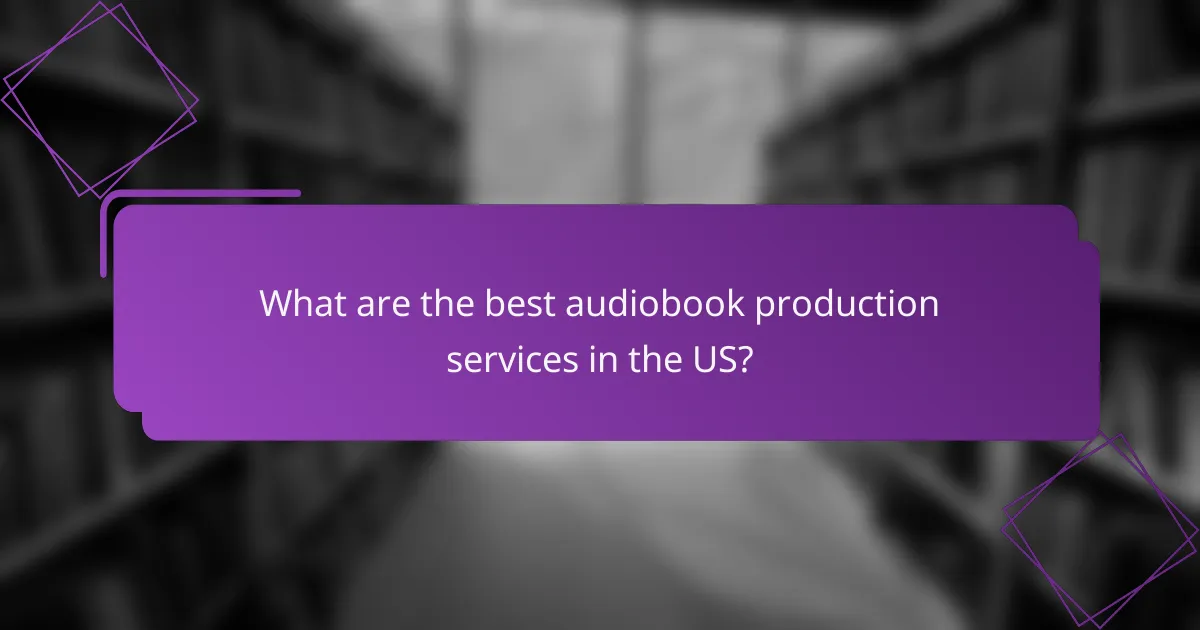
What are the best audiobook production services in the US?
The best audiobook production services in the US combine quality, affordability, and ease of use. Key players include Audible Studios, Findaway Voices, and ACX, each offering distinct features and pricing structures that cater to different needs.
Audible Studios
Audible Studios is known for its high production quality and extensive distribution network. They provide professional narration and sound engineering, ensuring a polished final product. However, their services can be on the pricier side, often requiring a significant budget.
When considering Audible Studios, think about the value of their established audience and marketing support. Their platform can help your audiobook reach a wider audience, which may justify the higher costs for some authors.
Findaway Voices
Findaway Voices offers a flexible and user-friendly platform for audiobook production. They allow authors to choose their narrators and provide a range of pricing options, making it accessible for various budgets. This service is particularly beneficial for independent authors looking to maintain creative control.
One key advantage of Findaway Voices is its extensive distribution network, which includes libraries and multiple retail platforms. This can significantly increase your audiobook’s reach without the need for a large upfront investment.
ACX
ACX, or Audiobook Creation Exchange, connects authors with narrators and producers. It operates on a royalty-sharing model, which can be appealing for authors with limited budgets. However, this means you may earn less per sale compared to other services that require upfront payments.
ACX is ideal for authors who want to enter the audiobook market without significant initial costs. Keep in mind that while this model can be cost-effective, it may take longer to see returns, depending on sales performance.
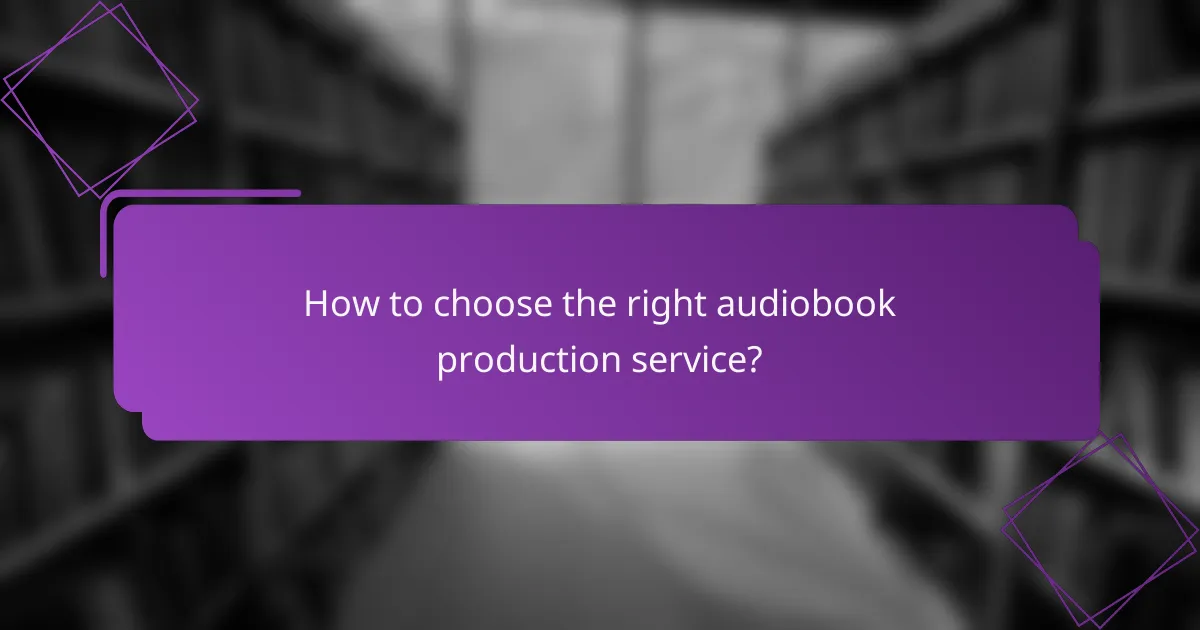
How to choose the right audiobook production service?
Choosing the right audiobook production service involves evaluating their offerings, checking client reviews, and comparing pricing models. This ensures you find a service that aligns with your project needs and budget.
Evaluate service offerings
When evaluating audiobook production services, consider the range of services they provide. Look for options that include narration, editing, sound design, and distribution, as these can significantly impact the final product.
Additionally, assess the quality of their narrators. Some services may offer a selection of voice talents, while others might have a more limited pool. Listen to samples to ensure the voice matches your book’s tone.
Check client reviews
Client reviews are crucial for understanding the reliability and quality of an audiobook production service. Look for testimonials on their website, but also check third-party review sites for unbiased feedback.
Pay attention to comments regarding communication, adherence to deadlines, and overall satisfaction with the final product. A service with consistently positive reviews is often a safer choice.
Compare pricing models
Pricing models for audiobook production can vary widely. Some services charge per finished hour, while others may offer flat rates or tiered pricing based on the complexity of the project.
Consider your budget and the specific services included in the pricing. For example, a lower upfront cost might not include editing or sound effects, which could lead to higher expenses later. It’s essential to clarify what is included in the quoted price to avoid unexpected costs.

What are the benefits of professional audiobook production?
Professional audiobook production offers high-quality audio, skilled narration, and effective marketing strategies that can significantly enhance the listener’s experience. By investing in these services, authors and publishers can reach a broader audience and improve their book’s overall impact.
High-quality audio and narration
One of the primary benefits of professional audiobook production is the assurance of high-quality audio and narration. Professional studios use advanced equipment and soundproof environments to create clear, engaging recordings. Skilled narrators bring characters to life, making the story more immersive for listeners.
When selecting a narrator, consider their experience and style. A well-matched voice can elevate the material, while a poor choice may detract from the listener’s enjoyment. Aim for narrators who have a proven track record in your genre to ensure the best results.
Effective marketing and distribution
Professional audiobook production often includes marketing and distribution support, which can be crucial for reaching potential listeners. Audiobook producers typically have established relationships with major platforms like Audible, Google Play, and Apple Books, facilitating smoother distribution and visibility.
Utilizing these marketing strategies can help maximize your audiobook’s reach. Consider promotional efforts such as social media campaigns, email newsletters, and partnerships with influencers in the literary community to boost sales and engagement.
Time and resource efficiency
Outsourcing audiobook production allows authors and publishers to focus on their core competencies, such as writing and marketing. Professional services handle the technical aspects of recording, editing, and mastering, saving valuable time and resources.
When budgeting for production, factor in the time saved by not having to manage these processes yourself. This can lead to faster project completion and the ability to allocate more time to other important tasks, such as writing new content or engaging with readers.
